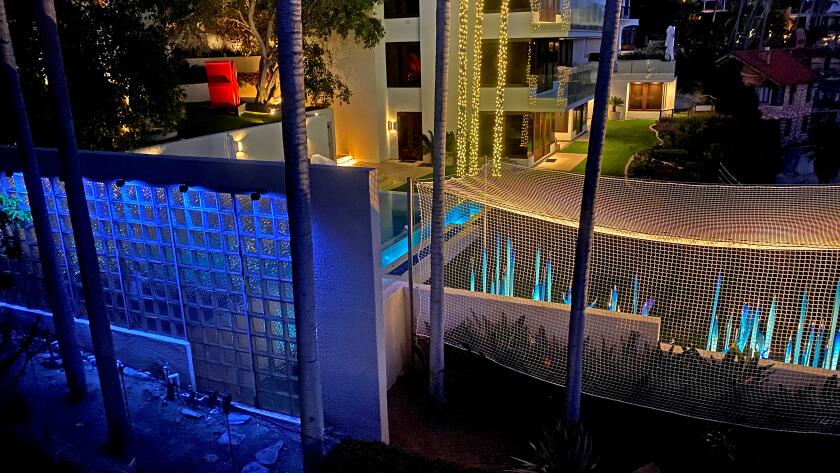Investor Bill Gross accused of blaring ‘Gilligan’s Island’ song on loop to torment Laguna Beach neighbor
A dispute between bond king Bill Gross and his next-door neighbor over a $1-million outdoor sculpture has devolved into police calls to their Laguna Beach mansions, multiple legal actions — and allegations that the billionaire investor blared the “Gilligan’s Island” theme song on a loop at all hours to annoy his neighbor.
The Pimco co-founder and his partner, former professional tennis player Amy Schwartz, are being accused by tech entrepreneur Mark Towfiq and his wife, Carol Nakahara, of harassment and intentional infliction of emotional distress. The cause? A 22-foot-long blue glass installation — and an even bigger pole and netting structure erected to protect it — that Towfiq said blocked his view, prompting a complaint to the city.
It’s another in a long line of bitter quarrels between well-to-do neighbors in Southern California’s most expensive neighborhoods, who sometimes find that with a coveted address comes deep-pocketed adversaries and little peace of mind.
At issue this time is an artwork that can be lighted at night and features cobalt-colored reeds stretching nearly 10 feet in height, swimming marlin and globes inspired by traditional blown-glass Japanese fishing floats. It was created by Dale Chihuly, an artist whose striking blown-glass work adorns the ceiling of the Bellagio hotel’s lobby in Las Vegas.
The lawn sculpture was installed in 2019 and in itself appeared not to foment any trouble. The dispute began when Gross and Schwartz installed netting this year to protect the work after it was damaged, according to legal filings and city records.
Gross and Schwartz in a lawsuit say more than $50,000 damage, “apparently” caused by a thrown rock, is evidence of an “escalating campaign of vandalism”; Towfiq and his wife say it was probably damaged by something falling on it.
Redacted emails released to The Times by the city of Laguna Beach indicated someone associated with Gross and Schwartz told a code enforcement officer the netting was temporary and needed to protect the sculpture from “trees and mother nature,” and that a palm frond caused $100,000 in damage.
Towfiq and Nakahara, in their lawsuit say the netting was at first removed intermittently but later remained up, with Gross and Schwartz avoiding attempts to resolve the problem. That prompted Towfiq to call the city, which inspected the property and sent Gross a letter July 28 informing him that the netting, lighting and sculpture lacked the proper permits.
The quarrel has escalated since then.
The neighbor’s lawsuit accuses the billionaire and his partner of playing blaring music at all hours, including the “Gilligan’s Island” theme song, rap and pop, in an effort to force him to drop the complaint. The couple say they have had to take refuge twice with either relatives or in a hotel room. In an application for a temporary restraining order filed Oct. 15, which was granted, Towfiq cites a text message allegedly sent to him by Gross after he asked the music to be turned down: “Peace on all fronts or well [sic] just have nightly concerts big boy.”
What started as a fight over lawn art in Laguna Beach escalated into complaints that bond investor Bill Gross was playing music -- including the Gilligan’s Island theme song -- so loud it could be heard in his neighbor’s home.
“Defendant William Gross is a 76-year-old billionaire used to getting his way no matter what. As proven by their behavior here, Gross and his decades-younger-girlfriend, defendant Amy Schwartz, are bullies,” states the Superior Court lawsuit filed by Towfiq and his wife.
Gross and Schwartz, 51, actually beat their neighbors to the courthouse, filing their own lawsuit Oct. 13 and accusing Towfiq of developing an obsession with them, which included installing cameras directed at their property and “peeping tom behaviors.” In a request for a temporary restraining order filed last week that is pending, Gross said he had played music since moving in to the property and felt “trapped in my own home.”
“Defendent Towfiq appears to have a particular fascination not only with Mr. Gross but also Ms. Schwartz, particularly when the pair are swimming and thus wearing minimal, if any, clothing,” states the lawsuit, which accuses Towfiq of invasion of privacy, among other causes of action.
Towfiq, in his temporary restraining order application, said that after Gross and Schwartz complained to a police officer that he had inappropriately recorded them, he told the officer he made the videos on his property and only to record their “harassing noise violations” and “intrusiveness of their unpermitted additions.”
Schwartz issued a statement that the dispute was “very upsetting” to her because the sculpture, with its assorted blue pieces, was bought for her by Gross because her mother was ill.
“Since I have no children of my own, they are like my babies. My mother, who has Alzheimer’s, and I pray to them and she enjoys looking at them because it’s her favorite color and makes her smile,” she said in the statement.
Schwartz also said she and Gross were the “best neighbors” since they were only at the house about five days a month, for five months a year. She added that the noise from the nearby highway and ocean were a lot louder than their music.
Towfiq and his wife allege in their lawsuit that the harassment escalated to the point this month that loud music was played even when Gross and Schwartz were not home, “apparently controlling their sound system remotely.”
Neighborly disputes in Southern California’s wealthiest corners don’t only involve celebrities and entertainers, such as Jim Belushi and Justin Bieber — sometimes they include business leaders too.
One highly publicized case in 2017, ensnared KB Home Chief Executive Jeffrey Mezger, accused by Bel-Air neighbor and comedian Kathy Griffin of an obscene rant caught on tape over an allegedly noisy backyard party. The KB Home board announced it would dock his year-end bonus.
Nobody is docking Gross’ pay no matter what the outcome of this dispute. The bond investor retired last year and is worth an estimated $1.5 billion by Forbes. He made his vast fortune at Pimco, the Newport Beach bond house he co-founded in 1971 but left in an acrimonious 2014 split as returns fell and investors left.

Gross sued and accused a “cabal” of Pimco executives of pushing him out because of their “lust for power, greed and a desire to improve their own financial position,” while Pimco called Gross an abusive and disruptive force. The two sides reached a 2017 settlement that paid Gross’ family foundation $81 million, with the firm agreeing to honor its co-founder with various gestures, including creating an award that recognized his long history of philanthropy. Gross contributed $19 million to the foundation as part of the settlement, and this year signed the Giving Pledge, which requires signatories to give away the majority of their wealth.
Around the same time, he went through an acrimonious divorce from his second wife, with both sides obtaining restraining orders and Sue Gross accusing him of turning over a separate Laguna Beach home to her in “utter chaos and disrepair,” including infusing it with puke and fart smells dispensed from spray bottles. In a mea culpa, Gross admitted in a Financial Times interview last year that he bought the spray at a drugstore and wasn’t even sure why he did it, though he alluded to the strain of a divorce that had gotten “very ugly.”
Towfiq, 56, an Orange County businessman who owned a data center operator, is no stranger to defending his property rights in court. He bought the South Coast Highway property in 2009 hoping to build his dream home in the exclusive Rockledge neighborhood. But he first had to endure a protracted legal battle with a neighbor who opposed the project, citing its proximity, effect on coastal access and other issues. The neighbor tried to get the City Council and California Coastal Commission to stop the project and took legal action, but Towfiq ultimately prevailed.
The home also raised eyebrows because of its design by prominent modernist architect Mark Singer. After it was completed, though, the home — with its spectacular views, 2,000-square-foot covered patio and infinity edge pool — received a glowing write-up in the Orange County Register. The paper lauded Singer, who died in 2015, for “creating structures that harmonized with nature while at the same time making a bold, contemporary claim to the space they occupy.”
Gross made his own news when the Register reported in 2018 he had picked up the property next door for $32 million, just a month after buying another seaside Laguna Beach property for nearly $36 million. A spokesman said he jointly owned the Rockledge property with Schwartz.
The 10,000-square-foot home, dubbed Rockledge-by-the-Sea, features a nearly 3,000-square-foot master suite, gym, wine-display room and commercial-grade elevator, according to the paper. Gross has other museum-quality art inside and outside the mansion, including one of Robert Indiana’s famous “Love” statues.
A hearing on Towfiq’s request to convert the temporary restraining order into a lengthier civil harassment order is set for Nov. 2. Meanwhile, Gross has been given an extension until Nov. 16 to seek the proper permits, which a spokesman said were being pursued.
Neither Towfiq nor Gross agreed to be interviewed, according to their representatives.
Laurence Darmiento is a staff writer with the Los Angeles Times.
All the latest on Orange County from Orange County.
Get our free TimesOC newsletter.
You may occasionally receive promotional content from the Daily Pilot.





